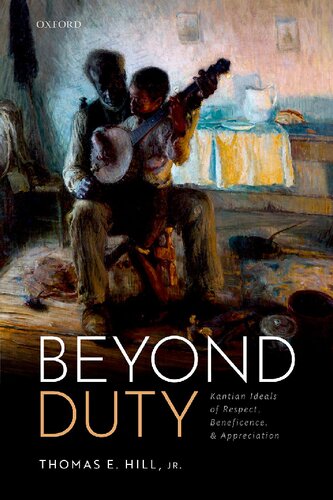Beyond Duty Kantian Ideals of Respect Beneficence and Appreciation 1st edition by Thomas Hill 0192660217 9780192660213
$50.00 Original price was: $50.00.$25.00Current price is: $25.00.
Beyond Duty: Kantian Ideals of Respect, Beneficence, and Appreciation 1st edition by Thomas E. Hill Jr. – Ebook PDF Instant Download/DeliveryISBN: 0192660217, 9780192660213
Full download Beyond Duty: Kantian Ideals of Respect, Beneficence, and Appreciation 1st edition after payment.

Product details:
ISBN-10 : 0192660217
ISBN-13 : 9780192660213
Author : Thomas E. Hill Jr.
Beyond Duty presents a new collection of essays on Kantian moral theory and practical ethics from a distinguished philosopher known for making Kantian ethics accessible and relevant to contemporary problems. With a new emphasis on ideals beyond the strictest requirements of moral duty, Thomas E. Hill, Jr. expands the core aspects of Kantian ethics and offers a broader perspective on familiar moral problems. Some essays explain Kantian concepts, while others review work of leading contemporary philosophers or raise challenging ethical questions for more general audiences. Crucially, Hill develops an ethical ideal of appreciation of people and their lives. Distinguished from both respect and beneficence, this has important implications about how we should think about close personal relationships, such as friendships, families, and relationships with people with disabilities. Part I focuses on Kantian moral theory. Topics include the structure of Kant’s argument in the Groundwork; his idea of imperfect duties to oneself; autonomy; and human dignity. Rawls’ constructivism is defended against O’Neill’s objections, and Kantian ethics defended against the charge of utopian thinking. Part II focuses on practical ethics, including the ethics of suicide; philanthropy; conscientious objection; and tragic choices when it seems that every alternative offends against human dignity. An essay on moral education contrasts Kantian and Rawlsian perspectives; another traces the role of self-respect in Rawls’ theory of justice and contrasts a Kantian conception. The volume concludes with two essays that develop and illustrate the ideal of appreciation.
Beyond Duty: Kantian Ideals of Respect, Beneficence, and Appreciation 1st Table of contents:
Part I: Kant and Kantian Perspectives
1. The Groundwork
Background: From the First Critique to the Groundwork
Preface: Aims and Methods
Section One: The Principle of a Good Will
Section Two: Duty Presupposes the Categorical Imperative and Autonomy of the Will
Section Three: Practical Reason Presupposes Autonomy of the Will
Questions of Interpretation
2. Imperfect Duties to Oneself
Background and General Concepts
One’s Duty to Oneself to Develop One’s Natural Powers
One’s Duty to Oneself to Increase One’s Moral Perfection
3. Kantian Autonomy and Contemporary Ideas of Autonomy
Autonomy of the Will in Kant’s Moral Theory
Kantian Autonomy as Distinct from Other Influential Conceptions
Common Conceptions of Autonomy in Practical Ethics as Distinct from Kant’s
From Kantian Autonomy to Practical Values and Principles
4. Rüdiger Bittner on Autonomy
Introduction
Various Senses of Freedom_ Bittner’s Project to Clean Up Ordinary Language
Kantian Autonomy: What Is It, What Are the Problems, and What Can We Retain?
5. Kantian Perspectives on the Rational Basis of Human Dignity
What Is Human Dignity?
By Virtue of What Is Dignity Attributed to Human Beings?
Why Believe in Human Dignity?
What Are the Practical Implications?
6. In Defense of Human Dignity: Comments on Kant and Rosen
Preliminary Points: Contemporary Resources and Potential Abuse of Theories
Can Diverse Ideas of Dignity Be Coherently Unified?
Problems of Application: Indeterminacy and Absolutism
Metaphysics or Morals?
7. The Kingdom of Ends as an Ideal and a Constraint on Moral Legislation
Summary of the Deliberative Framework
Human Dignity
Positive Ideals of Human Dignity
8. Kantian Ethics and Utopian Thinking
Problem Cases: (A) Lying to the Murderer and (B) Torture and the Ticking Bomb
What Are “Utopias” and (Unwarranted) “Utopian Thinking”?
Some Potentially Good Uses of Utopias
Corresponding Dangers of Bad “Utopian Thinking”
“Utopian Thinking” in Rousseau’s Political Philosophy
Similar Utopian Thinking in Everyday Life and in Kantian Ethics?
Concluding Note
9. Varieties of Constructivism
Introduction
O’Neill’s Kantian Projects: Aims, Limits, and Development
Points of Agreement and General Objections to Rawls’ Constructivisms
Arbitrary Authority and Restricted Domains: A Problem for Rawls?
Further Objections: Are Specific Features of Rawls’ Theories Arbitrary?
Concluding Note about Remaining Questions
Part II: Practical Ethics
10. Human Dignity and Tragic Choices
Preview
Examples and Theoretical and Practical Challenges for Philosophers
Brief Historical Background: Consequentialists, Pluralists, and Kantians
Comments on Terminology
Aspirations and Limits of Normative Moral Theory
Why Turn to Kantian Normative Theory?
Kantian Constructivism in Normative Ethics
Two Objections and Responses: Non-conformity and Disagreement
Human Dignity: A Kantian Interpretation
Responses to Objections
Persistent Examples: Are Lies and Torture Always Wrong?
Concluding Remarks: The Value of Simplicity
11. Duties and Choices in Philanthropic Giving: Kantian Perspectives
Background and the Supreme Moral Principle(s)
A Kantian Framework for Thinking about Moral Principles and Choices
Kant on the Imperfect Duties of Beneficence and Mutual Aid
Is the Kantian Duty to Give Aid Too Anemic?
Must We Regard Others’ Happiness as More Important Than Our Own?
Can Promoting Others’ Happiness Be Good to Do But beyond Duty?
Complicating Factors
12. Killing Ourselves
The Concept of Suicide and the Central Moral Questions
Different Perspectives on Suicide: Theological, Libertarian, and Consequentialist
Obligations to Others
Respecting One’s Own Dignity as a Human Being: A Modified Kantian Perspective
Appreciation: Further Reflections on the Value of Continued Life
Concluding Note: Assisted Suicide
13. Conscientious Conviction and Conscience
Conscientious moral conviction
II. Conscience
Concluding Remarks
14. Stability, A Sense of Justice, and Self-Respect
Stability, its Role, and Rawls’ Two Lines of Argument
Moral Psychology and a Sense of Justice
Self-Respect and the Kantian Interpretation
Values Not Lost in the Move to Political Liberalism
15. Two Conceptions of Virtue
Kant’s Conception of Virtue
Cultivating Kantian Virtue: The Good News and the Bad News
Rawls on a Sense of Justice
How Rawls Goes Beyond Kant
Concluding Questions
Postscript
16. Beyond Respect and Beneficence: An Ideal of Appreciation
Investigating Ideals of Moral Attitude: Aims and Methods
Beneficent Concern for Others’ Happiness
Respect
Appreciation
Concluding Remarks
17. Ideals of Appreciation and Expressions of Respect
Aims, Method, and Larger Project
Appreciation
Positive Expressions of Respect
Ideals Inherent in Human Dignity
An Analogy: Local and Global Dignity
Human Dignity from a Kantian Perspective
Application to Disabilities: Appreciation
Application to Disabilities: Positive Expressions of Respect
People also search for Beyond Duty: Kantian Ideals of Respect, Beneficence, and Appreciation 1st:
kant’s idea of duty
kant duty of beneficence
kantian duty-based ethics
kant’s concept of duty
beyond duty kantian ideals of respect beneficence and appreciation
Tags: Beyond Duty, Kantian Ideals, Respect, Beneficence, Thomas Hill
You may also like…
Engineering - Electrical & Electronic Engineering
Principles of Electronic Communication Systems 5th Edition by Louis Frenzel 1260789365 9781260789362
Politics & Philosophy - Anthropology
Respect: Philosophical Essays Richard Dean And Oliver Sensen
Business & Economics - Mathematical Economics
Taming the Megabanks Arthur 1st edition by Wilmarth Jr 0190260729 9780190260729
Crime
Mathematics - Others
Engineering - Telecommunications
History
Medieval Monarchy in Action: The German Empire from Henry I to Henry IV Boyd H. Hill Jr 1st Edition
Romance












